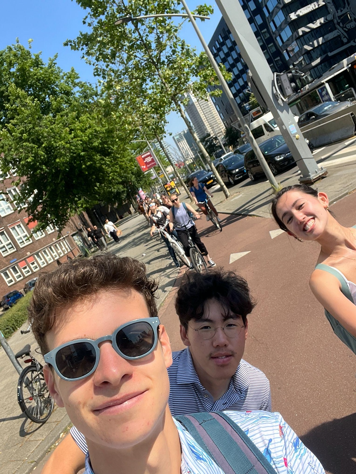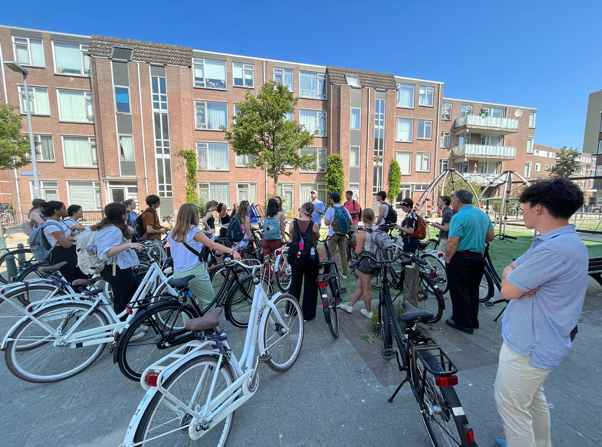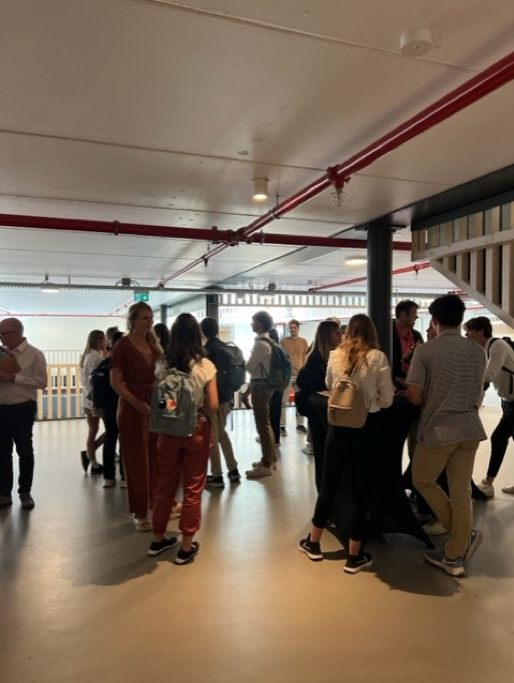The Future of Bike Infrastructure and Green Hydrogen in the Netherlands
July 14, 2023
The 9th of June was a particularly stimulating day, with a good balance between work and leisure. Students in the UNC Burch Sustainability program have learned a few main concepts today: (1) cities are growing and infrastructure for bikes is a must, (2) green hydrogen is an up-and-coming energy source, and (3) Rotterdam and the Netherlands should be a source of inspiration for transport systems all over the world.
In the morning we visited the headquarters of Mobycon, a company aimed at developing and implementing safe and efficient mobility solutions. In particular, our focus was on the Dutch biking infrastructure, an inspirational model for the rest of the world. First of all, we had the pleasure to meet Brett Petzer and Anna Wyner, respectively a cycling infrastructure planner and a sustainable mobility consultant at Mobycon. The two of them presented the sustainable transport system of Rotterdam and the Netherlands, which is the product of a long and complex transformation that began with the first protests against traffic fatalities in the 1970s. Following the “Vision Zero” goal, the Netherlands was able to make biking not only convenient but also safe, to the point where, as we noticed going around Rotterdam, almost no biker wears a helmet. Brett pointed out how a sustainable approach to cycling should guarantee bikers’ safety through legal and infrastructural facilitation, which would surely be better protection than a helmet. Additionally, as Brett said, “A good bicycle network starts with a good car network”. The presentation was great food for reflecting on the approach to sustainable transport in heavily car-dependent countries like the US.
Afterward, Brett and Anna took us on a bike trip around Rotterdam. We visited many inspiring places, including a residential area purposely designed to increase what Brett called the “mental load” of car drivers, and a gentrified neighborhood with percentages of social housing that are still above the average in the US. The convenience and efficiency with which we toured the city were tangible proof of what we learned during the presentation, and they showed us students a clear direction to work toward: a cycling-oriented transportation model.

After receiving a biker’s perspective of Rotterdam, and lunch, we traveled to The Hague to meet with a prominent green hydrogen company called HYGRO. HYGRO is a green hydrogen energy company based here in the Netherlands. They formed in 2016 and have recently started receiving traction. Their mission, as stated in the presentation given, is to become the Dutch market leader for road-distributed hydrogen while replacing diesel. Currently, they have a project named Duwaal that has been successful so far with their first set of joint initiatives. This is the chain ‘from wind to wheel.’ This includes integrated hydrogen production in a wind turbine, integrated high-pressure storage, transport and distribution system by road, from wind to at least five hydrogen refueling sites, and bundled procurement and management of 100 hydrogen trucks. In short, this project means an acceleration of the hydrogen economy in the Netherlands. Not only does Duwaal reduce greenhouse gas emissions, but it also prevents noise pollution. Lastly, for Duwaal, HYGRO was awarded an 11.8 million euro grant from DEI (demonstration of energy innovation) to help kick start the chain of sustainable hydrogen production up to and including sales in road transport.
While they have a great business in the Netherlands, they have been considering options in the U.S. We as students were able to provide them with information and areas that look promising for hydrogen-wind integration. Some state examples are Virginia, Louisiana, and Georgia. HYGRO has more experience with onshore hydrogen wind turbines but they are open to offshore opportunities as well. It was amazing that we could have a two-way discussion with company members. After our discussion, we moved to the main room and were able to chat with each other and also have snacks/drinks. This gave us the ability to ask deeper questions and personally connect with them.

We spent the rest of the day grabbing dinner and making our last night in Rotterdam one to remember! We are going to miss this place and the people we have met along the way.
About the Author
This article was written by Ava Barlow, Class of 2025, Environmental Science & Political Science with an Information Systems minor, and Tommy Zucchinali, Class of 2026, Environmental Science with a Chinese language minor.
